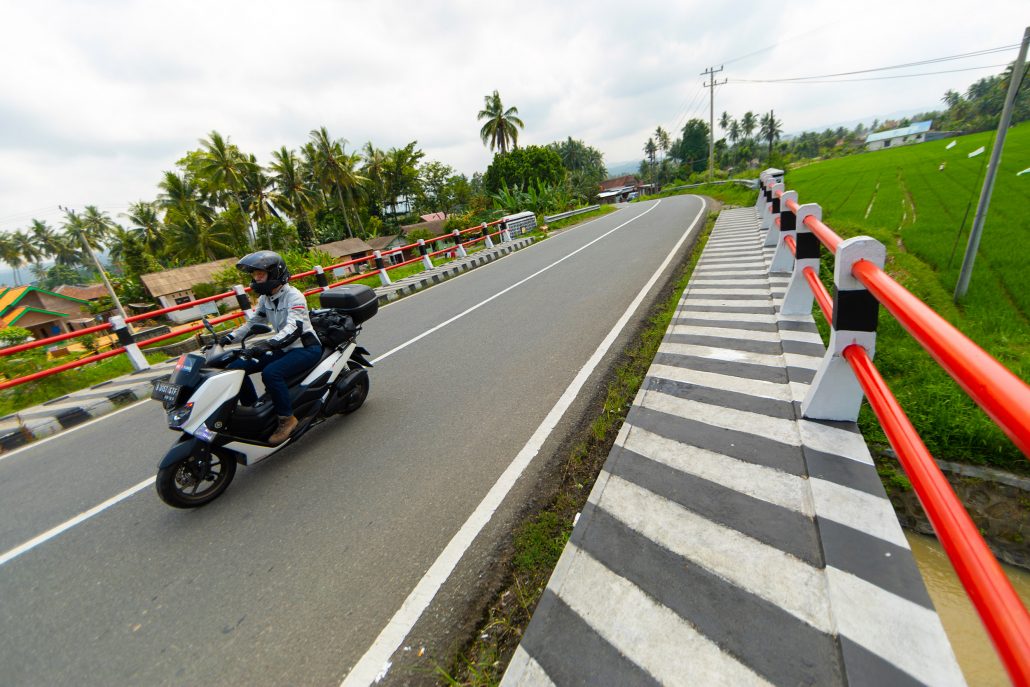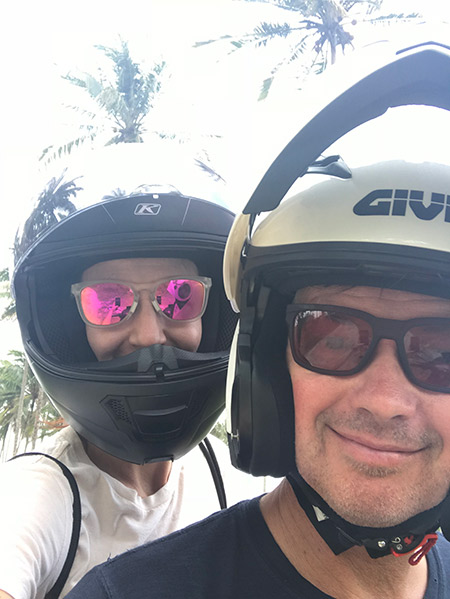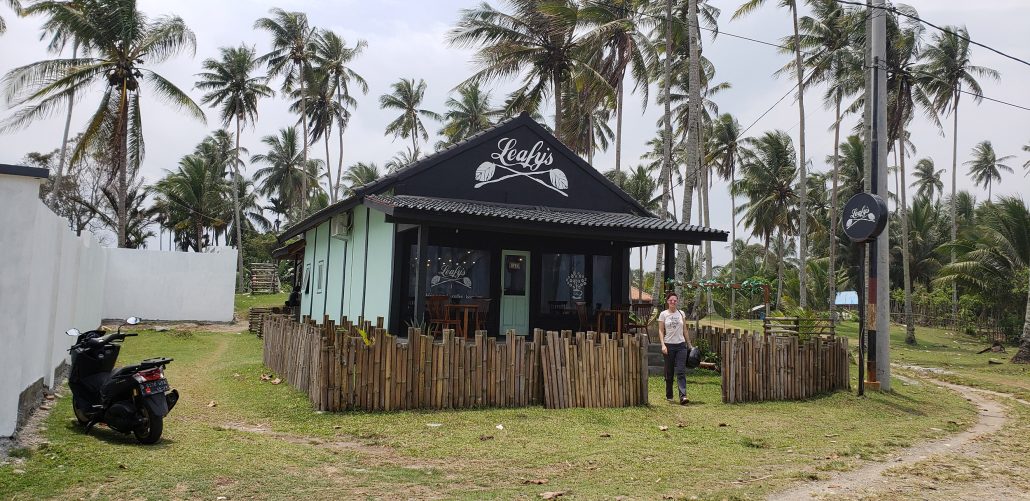AMERICAN MOTORCYCLIST MARCH 2019
Scootering Through Indonesia
Sometimes The Simplest Plans Go Awry

Rocky Ridge Lake along the Lolo Motorway
By Jeff Kardas
With combined travel experiences between myself and Cristi Farrell that covered four continents—much of which was on two wheels—we felt prepared for virtually anything. When deciding upon an interesting and challenging location and transportation mode for Cristi’s annual sabbatical, we decided on Indonesia because we didn’t know what to expect.
Hence, the adventure.
Cristi has been all over South America, throughout India, Nepal, Bhutan, Morocco, etc., all on motorcycles, and mostly solo. I’ve been riding on and off-road for the better part of four decades, working on my own bikes along the way. We could handle this.
We planned to begin the journey at GIVI’s Indonesian headquarters in Jakarta, on the island of Java. There, we were to pick up two Yamaha NMAX 155 scooters because we chose to experience this island nation on the “ride of the people.” And based on what we were able to derive about travel within the country, the vast majority of the population commutes day-to-day by scooter.
Beyond what we’d be riding — and agreeing to limit our adventures to the islands of Sumatra and Java — that was the extent of our planning. We were truly winging it and, as sometimes happens, that’s when to expect the unexpected.
Upon receiving the Yamahas, we geared-up in full motorcycle riding apparel—GIVI and Hevik helmets, jacket, pants with leather boots—and looked perfectly the part of two westerners heading out on a journey in Indonesia… on scooters.
This ultimately proved to be problematic. While our initial goal of being on the “ride of the people” was achieved, the fact that we stood out like sore thumbs seemed like it might eventually work against us.
This first became apparent as we left the GIVI facility and headed out from northwest Jakarta toward the port city of Cilegon, where we intended to hop a ferry to Sumatra.
Aside from the staff who worked at the shop looking at us like we were nuts, we could see that the locals on scooters weren’t dressed like us, and, in fact, quite the opposite was true. Flip-flop sandals and scant clothing were the norm.
Our route seemed simple while looking at Google Maps. We needed only to follow the Route 1 toll-road, and two hours later we’d arrive at the ferry. And that is where the plan unraveled.

..we could see that the locals on scooters weren’t dressed like us, and, in fact, quite the opposite was true. Flip-flop sandals and
scant clothing were the norm.”
The first major oversight in planning became apparent when we were advised that two-wheeled vehicles were not permitted on the toll-roads/highways and we’d need to travel rural roads for the entire journey.
Initially this came as a shock. We’d hoped to quickly exit the relative mayhem of the Jakarta area and head out into the vast open spaces of Sumatra. Seeing now that our two-hour transit to the ferry was now more like four hours, we decided to spend an extra night in the nation’s capital to regroup. It was Day One of potentially a three-week journey, and we were already regrouping!
With a fresh mind, the following morning’s ride promised to be an adventure. After leaving the shop, we dove directly into the “real” Java—the endless stretches of roads, paths, trails, driveways and, effectively, cow paths that run alongside the toll roads, so that the masses on scooters and motorcycles (less than 150cc) could travel from point A to point B.
This was, honestly, an overwhelming experience to start our journey. Despite Cristi’s experiences within other third’ish-world countries, she was taken aback at the relative mayhem that ensued on the rural roadways in northwest Java.
Four hours of seething humanity in every form and aboard or within every type of vehicle imaginable on roads that were, with only an occasional exception, in dire need of repair. Riders and drivers from all directions, coming from all sides with horns blasting, considered the various street signs and markings not so much as “laws” and “rules,” but more as “suggestions” and “guidelines.” This meant we had jumped head first into a very shallow pool. We feared we were in over our heads.
Perhaps more remarkable about the long, winding, discombobulated and unpredictable series of roads to Cilegon was that there was absolutely no break in the mayhem. There were vehicles everywhere, always, coming from every direction on one of the most heavily traveled roadways we’d ever experienced. Additionally, along with the roadside, there were seemingly nonstop houses, broken down buses and trucks (typically repaired on the spot), buildings, fences, store-fronts/homes, repair shops, food stands and the like. And there simply was no open space whatsoever.
We’ve been asked what the countryside in the area was like. We answered unequivocally that we have no idea. Not only could we not see any of it, but we never had time to look away from the road long enough to get a decent look, even it had been in view.
While this exhausting four-hour jaunt to a two-hour ferry ride took its toll on us, something else became very apparent about these people and machines we’d been dodging through traffic all day. They knew how to ride!
It was incredible the level of spatial awareness they possessed in what came off to us as utter chaos. We did not notice a single driving or riding related incident—not one altercation, dropped bike or crashed truckload of chickens. Not one tumbled cart or jackfruit stand, and there was not a single dropped baby or sibling off the “family scooter.” Nothing. We were in utter disbelief as we finally rolled into the line to purchase our ferry tickets at nearly 4 p.m.

Rocky Ridge Lake along the Lolo Motorway
While each portion of this, or any, journey could itself be turned into a longwinded recap of excruciating details, suffice to say that we made it to our resort/hotel at roughly 9 p.m. In doing so, we broke one of very few rules that was laid out to us by our hosts: Never ride after dark.
Why? Because of “bandits” on the roads, particularly on the roads just past the ferry station in southern Sumatra. Apparently, it’s not at all unusual for desperate locals to ambush and rob commuters on the only road into that part of the island. We had to drive its entire length well after dark and entirely on our own. And we couldn’t figure out how to activate the headlight on one of the scooters, so we had that strike against us too.
Alas, we did make it and, while the place was gorgeous, it was effectively in a compound behind tall walls topped with barbed wire and with security guards at the front gate. All of this just reinforced for us that we were effectively in danger everywhere we went in the country, if for no other reason than we stood out like sore thumbs as wealthy tourists.
Taking all of this in, we retired to our (quite nice) bungalow (which was roughly $25 a night) and headed down for a well-deserved beer. Unfortunately, this primarily Islamic area of Indonesia didn’t serve alcohol in any form. At this point, I knew we were in for a long few weeks.
We awoke the next day to a beautiful morning on the gorgeous, if slightly run-down, grounds, ate a quick breakfast and hit the road. We’d hoped to get within striking distance of the west coast, where it seemed the population was much less dense and things were a bit more vacation-like.
To do that, we’d have to put in back-to-back, very challenging five- to six-hour days. Which we did, only to be greeted with a non-existent motel when we finally arrived. After 12 hours of riding on this island, traversing land, sea, mountain roads and dense urban areas, we had arrived at a ghost motel.
Thankfully, Cristi was able to get on her phone (LTE and 3G service was incredibly consistent everywhere we went) and find an extraordinarily sympathetic ex-pat who owned a surf hut on the beach. He was completely booked for the foreseeable future, but offered us his own bed to sleep in, if we really needed somewhere to stay. We did, and we took him up on the offer.
While it wasn’t a shack, it was certainly a surfer’s paradise, as it was literally right on the beach and within a short swim to several popular breaks. They cooked for us, had seemingly endless ice-cold beer(!), and let us just relax with them in their little piece of paradise for a couple of days. This was when we realized that when one needs a vacation from a vacation, it isn’t much of a vacation.
With this realization, we decided to throw in the towel with regard to going any farther up the coast. We just weren’t enjoying ourselves and felt like we were hugely at risk of injury, at the very least.
Just the prospect of getting back to Jakarta at this point seemed like an unreachable goal, but we went for it. We dodged an infinite number of obstacles in the three-day return trip over roads we’d already traversed, but that seemed even more dangerous this time around.
It would be nice to say we were just getting into the groove by the time we arrived in Jakarta, but that wasn’t the case. Completely and utterly exhausted—mentally more so than physically—we couldn’t have been happier to arrive at GIVI’s headquarters and return the scooters.
It truly is a small miracle that we made it unscathed, but we did. While it was an amazing experience, it’s not one that will be repeated—at least not on scooters.
Jeff Kardas and Cristi Farrell are AMA members from Los Angeles.
